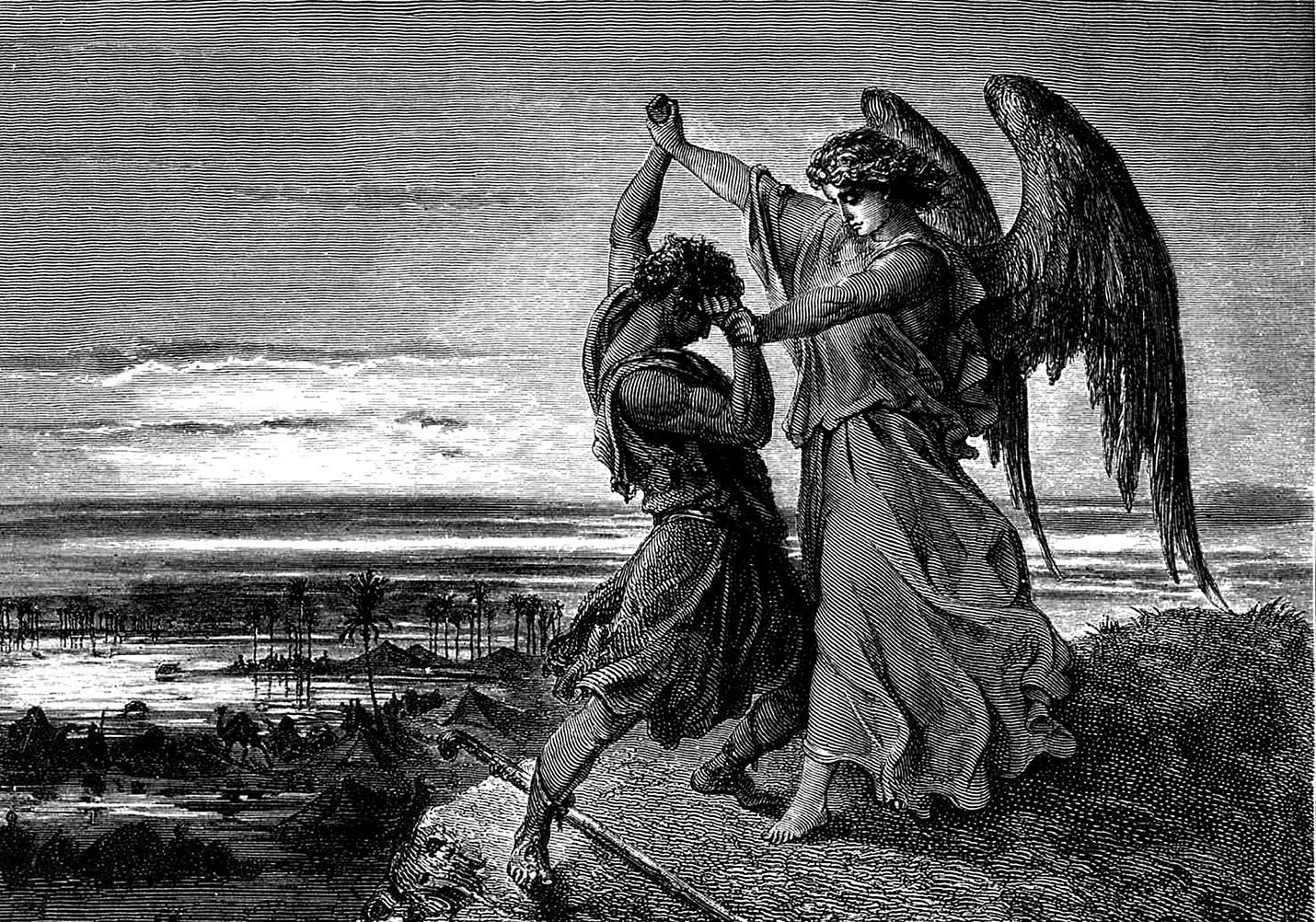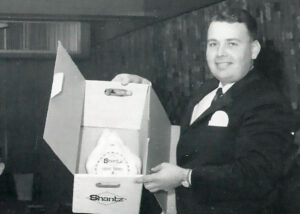“The same night [Jacob] got up and took his two wives, his two maids and his 11 children, and crossed the ford of the Jabbok. He took them and sent them across the stream, and likewise everything that he had. Jacob was left alone; and a man wrestled with him until daybreak. When the man saw that he did not prevail against Jacob, he struck him on the hip socket; and Jacob’s hip was put out of joint as he wrestled with him. Then he said, ‘Let me go, for the day is breaking.’ But Jacob said, ‘I will not let you go, unless you bless me.’ So he said to him, ‘What is your name?’ And he said, ‘Jacob.’ Then the man said, ‘You shall no longer be called Jacob, but Israel, for you have striven with God and with humans, and have prevailed.’ Then Jacob asked him, ‘Please tell me your name.’ But he said, ‘Why is it that you ask my name?’ And there he blessed him. So Jacob called the place Peniel, saying, ‘For I have seen God face to face, and yet my life is preserved.’ The sun rose upon him as he passed Peniel, limping because of his hip.” (Genesis 32:22-31)
This odd story of Jacob’s wrestling match breaks into a broader narrative where Jacob is preparing to meet Esau, his brother from whom he stole the birthright. Jacob is fearful that Esau will want to kill him for his deception and Esau has threatened as much. Jacob is a trickster with a history of deception and manipulation—his very name means “one who deceives”—so he is right to fear the consequences of his actions.
The tale of Jacob’s overnight wrestling match disrupts the flow of the broader story to tell us this strange and mysterious tale of a being who wrestles all night with Jacob. It is a physically intimate scene, with these two locked in combat in the dark. It is a violent scene, with Jacob prevailing but only after suffering a dislocated hip. And it is also dislocated as a story, with unanswered questions and unexpected consequences.
As for the opponent, many interpreters, both Jewish and Christian, have tried to determine who exactly it was. Was it a human man, a stranger, an angel, the spirit of Esau? Was it God? We are told that Jacob’s understanding is that through the encounter he has seen God face-to-face, but the details are hazy and mysterious.
Room for imagination
When we read foundational faith stories like this, we can incorporate a number of different ways of interpreting them, different ways of understanding what God might be saying to us through them. It is helpful to have an understanding of the culture and worldview of the day, as much as we can, and it is also helpful to understand oral tradition and storytelling purposes.
Another way we can approach these stories is through our imagination. Imagination and religion have a complicated relationship, partly because imagination is unpredictable and sometimes chaotic, and partly because it is personal and so it cannot be controlled by other people.
Perhaps this story of Jacob, like so many in Scripture, leaves many gaps precisely so that there is room for our imagination, room for us to fill in details and participate in the story according to our own interpretation. It provides an opportunity for us each to share our own unique take on the story that is told.
A Christian imagination works with reason to search stories for what is true, to look for meaning, to look for emotional connection and to look for God. When we read the story of Jacob, we might consider how our minds embellish the story:
• What are the details that we add?
• How do we imagine it?
• Can we imagine ourselves as Jacob?
• Can we imagine ourselves as his assailant?
• Do we see ourselves as an observer?
• How do we use our imagination to weave a meaning?
What my Christian imagination does with this story
What jumps out at me is the way that Jacob’s opponent responds to Jacob’s request for his name. Jacob politely asks, “Please tell me your name,” and the response is, “Why is it that you ask my name?” as if to say, “You ought to know the answer.”
I am reminded when I read this of the psychological and cultural idea of our shadow—that is, the negative side of our character that we hide and deny. A recurring theme not only in psychology and literature, but also in cultural practices all over the world, is the idea that as human beings our quest is to understand and fight with our own shadow. The response of the assailant then means, “Why is that you ask my name, Jacob? I am you.”
If we imagine the story this way, Jacob experiences quite literally a dark night of the soul. He faces down his own shadow and, rather than using deception as he has before, has to do this honestly, head on. We can imagine, then, in this solitary moment, that Jacob is wrestling with his life of deception, with his own sense of guilt about deceiving his brother, and with his unresolvable woundedness at being the second-born son.
Surely, this is a way of imagining this story of Jacob that resonates with us. Just like Jacob, we, too, have a history of deliberate sinning and we, too, sin and suffer from a place of unresolvable woundedness. We all have a shadow side to our character. What do we do with this aspect of our character that we prefer to hide, the side that destroys and leads us away from God and from others? We may try to deny it or hide it, but we must face it or it will come and wrestle with us whether we like it or not. It will come back to bite us in the . . . hip! And, like Jacob, it is when we are alone with time to think that this often happens.
God in the struggle
Jacob recognizes that, through this fierce and painful fight, he encounters God (Genesis 32:30). Jacob’s sin in pursuing blessing by any devious means becomes his strength in determination as he gains a blessing after this honest wrestling with his shadowy opponent. Destructive forces are turned into creative promise.
God is in the midst of this struggle, at its heart. In God’s relentless pursuit of Jacob’s well-being, God wrestles with Jacob as much as Jacob wrestles with God, with his opponent, with himself, intimately, forcefully, bodily. After the fight, even though he has a dislocated hip, Jacob refuses to let his opponent go until his assailant blesses him. Jacob is again determined to gain a blessing by whatever means he can.
Notice that in response to this request the opponent replies, “What is your name?” It is as if the opponent is reminding Jacob of the name he was given and is asking him what identity he wants to claim now, who he wants to be after persevering in this struggle.
Theologian Walter Wink writes that “it is God who sets before us our need for healing, God who meets us in the wound, God the terror who frightens us in the darkness of the unknown life that wells up from our own depths, God who needs our healing, God who heals us.”
Whatever our wound, whatever our shadow, God is with us in our complexity, turning our wound into strength by God’s grace. Light always casts a shadow, and we consist of both as our complex and beloved selves.
Blessing others and ourselves through our struggles
It is our own personal stories and struggles both with God and with ourselves that form us as individuals, and that can bless us with gifts we can share with others.
As Henri Nouwen writes in Life of the Beloved, “The first step to healing is not a step away from the pain, but a step toward it. When brokenness is . . . just as intimate a part of our being as our chosenness and our blessedness . . . we have to find the courage to embrace our own brokenness, to make our most feared enemy into our friend, and to claim it as an intimate companion.” Like Jacob, although we may feel dislocated and in pain, we must persevere long enough to ask for and receive a blessing, as Nouwen puts it, “allowing the blessing to touch us in our brokenness,” always so that we in turn can bless others.
Along with Jacob, we need not be governed by the fear of being discovered, or by the fear of fear, or by the flaws in our character we always thought were written in stone. We, too, are asked, “What is your name?” What is the identity that you choose now that encompasses all of you as you continue your journey with God?
God undergirds, surrounds, and holds us in the struggles we face as we live into our full humanity. Jesus, too, faced the temptations and trials that human beings struggle with in his time in the wilderness and in the Garden of Gethsemane: “We do not have a high priest who is unable to sympathize with our weaknesses, but we have one who in every respect has been tested as we are, yet is without sin” (Hebrews 4:15). The redemption of Jesus Christ’s struggle through the cross means that there is no depth or distance or darkness we can travel to that takes us out of the reach of God.
God is with us as we face our fears and struggles, as we claim our new, whole identity of body and soul, and as we are blessed by God to go out into the world using our reason and our imagination in God’s service for others.
Emma Pavey preached this sermon a few years while a member of Langley Mennonite Fellowship and a graduate student at the Vancouver School of Theology.
For discussion
1. When you read Genesis 32 where Jacob is involved in a wrestling match, who do you assume Jacob was wrestling with? What are some of the imaginative details that you add to the scripture passage?
2. Emma Pavey suggests that Jacob was wrestling with his own shadow, his “life of deception, with his own sense of guilt about deceiving his brother, and with his unresolvable woundedness.” Does this interpretation resonate with you? Do we all have a side of ourselves that we want to keep hidden?
3. What are some of the fears that keep us from confronting ourselves and our own brokenness? Do you have a story of struggle in your life? How did you experience God in the midst of your struggles?
4. Will Braun describes how Cheryl Braun struggled as she considered changing her career. Do you see any similarities between her story and Pavey’s description of Jacob’s struggles? Why is it important to face the deep, dark things that we are afraid to put into words?
—By Barb Draper









Leave a Reply
You must be logged in to post a comment.